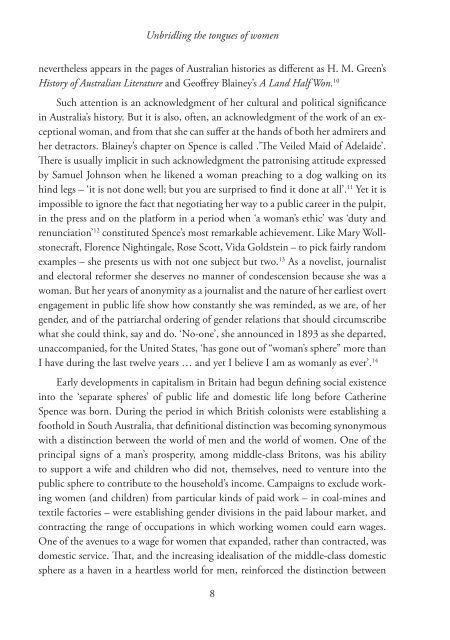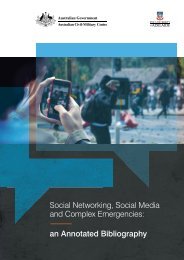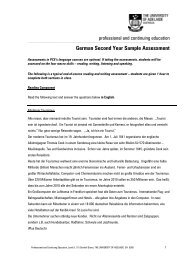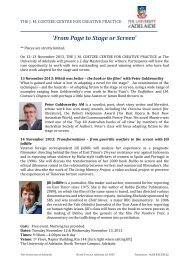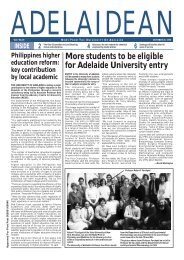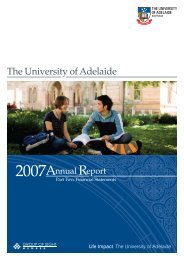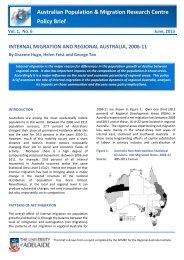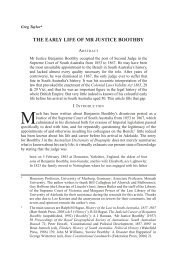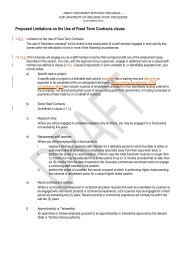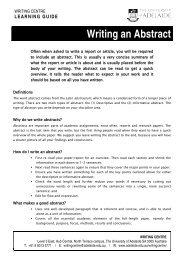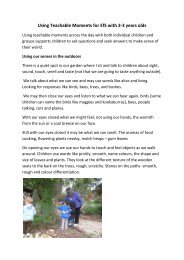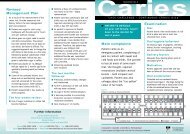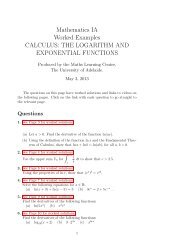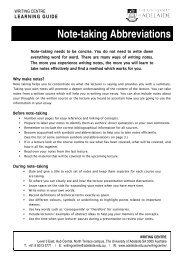Unbridling the Tongues of Women - The University of Adelaide
Unbridling the Tongues of Women - The University of Adelaide
Unbridling the Tongues of Women - The University of Adelaide
You also want an ePaper? Increase the reach of your titles
YUMPU automatically turns print PDFs into web optimized ePapers that Google loves.
<strong>Unbridling</strong> <strong>the</strong> tongues <strong>of</strong> women<br />
never<strong>the</strong>less appears in <strong>the</strong> pages <strong>of</strong> Australian histories as different as H. M. Green’s<br />
History <strong>of</strong> Australian Literature and Ge<strong>of</strong>frey Blainey’s A Land Half Won. 10<br />
Such attention is an acknowledgment <strong>of</strong> her cultural and political significance<br />
in Australia’s history. But it is also, <strong>of</strong>ten, an acknowledgment <strong>of</strong> <strong>the</strong> work <strong>of</strong> an exceptional<br />
woman, and from that she can suffer at <strong>the</strong> hands <strong>of</strong> both her admirers and<br />
her detractors. Blainey’s chapter on Spence is called .’<strong>The</strong> Veiled Maid <strong>of</strong> <strong>Adelaide</strong>’.<br />
<strong>The</strong>re is usually implicit in such acknowledgment <strong>the</strong> patronising attitude expressed<br />
by Samuel Johnson when he likened a woman preaching to a dog walking on its<br />
hind legs – ‘it is not done well; but you are surprised to find it done at all’. 11 Yet it is<br />
impossible to ignore <strong>the</strong> fact that negotiating her way to a public career in <strong>the</strong> pulpit,<br />
in <strong>the</strong> press and on <strong>the</strong> platform in a period when ‘a woman’s ethic’ was ‘duty and<br />
renunciation’ 12 constituted Spence’s most remarkable achievement. Like Mary Wollstonecraft,<br />
Florence Nightingale, Rose Scott, Vida Goldstein – to pick fairly random<br />
examples – she presents us with not one subject but two. 13 As a novelist, journalist<br />
and electoral reformer she deserves no manner <strong>of</strong> condescension because she was a<br />
woman. But her years <strong>of</strong> anonymity as a journalist and <strong>the</strong> nature <strong>of</strong> her earliest overt<br />
engagement in public life show how constantly she was reminded, as we are, <strong>of</strong> her<br />
gender, and <strong>of</strong> <strong>the</strong> patriarchal ordering <strong>of</strong> gender relations that should circumscribe<br />
what she could think, say and do. ‘No-one’, she announced in 1893 as she departed,<br />
unaccompanied, for <strong>the</strong> United States, ‘has gone out <strong>of</strong> “woman’s sphere” more than<br />
I have during <strong>the</strong> last twelve years … and yet I believe I am as womanly as ever’. 14<br />
Early developments in capitalism in Britain had begun defining social existence<br />
into <strong>the</strong> ‘separate spheres’ <strong>of</strong> public life and domestic life long before Ca<strong>the</strong>rine<br />
Spence was born. During <strong>the</strong> period in which British colonists were establishing a<br />
foothold in South Australia, that definitional distinction was becoming synonymous<br />
with a distinction between <strong>the</strong> world <strong>of</strong> men and <strong>the</strong> world <strong>of</strong> women. One <strong>of</strong> <strong>the</strong><br />
principal signs <strong>of</strong> a man’s prosperity, among middle-class Britons, was his ability<br />
to support a wife and children who did not, <strong>the</strong>mselves, need to venture into <strong>the</strong><br />
public sphere to contribute to <strong>the</strong> household’s income. Campaigns to exclude working<br />
women (and children) from particular kinds <strong>of</strong> paid work – in coal-mines and<br />
textile factories – were establishing gender divisions in <strong>the</strong> paid labour market, and<br />
contracting <strong>the</strong> range <strong>of</strong> occupations in which working women could earn wages.<br />
One <strong>of</strong> <strong>the</strong> avenues to a wage for women that expanded, ra<strong>the</strong>r than contracted, was<br />
domestic service. That, and <strong>the</strong> increasing idealisation <strong>of</strong> <strong>the</strong> middle-class domestic<br />
sphere as a haven in a heartless world for men, reinforced <strong>the</strong> distinction between<br />
8


